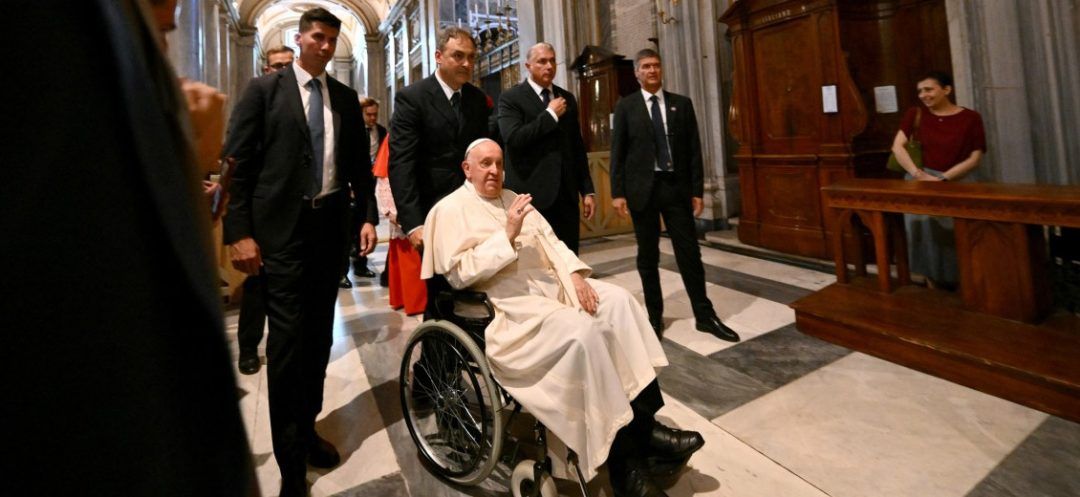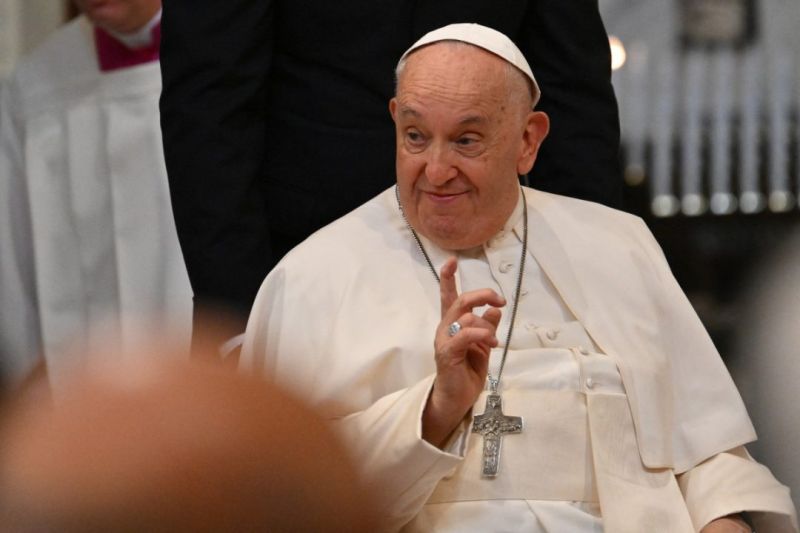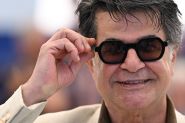
©Photo Credit : Alberto Pizzoli / AFP
Pope Francis advocates for the power of reading and champions this brain activity for personal and spiritual growth.
Pope Francis's literary inclinations took center stage on Sunday, August 4, as the Vatican released a letter in which the pontiff extolled the virtues of reading, particularly for young priests. In his July 17 letter, published in eight languages, the pope revealed his admiration for great tragedies while encouraging priests-to-be to delve into novels and poems to enrich their spiritual and personal lives.
"How can we speak to the hearts of men and women if we ignore, set aside, or fail to appreciate the 'stories' through which they express and reveal the drama of their lived experiences?" he asked. The lengthy letter is interspersed with references to literary icons such as C.S. Lewis, Marcel Proust, T.S. Eliot, and fellow Argentinian Jorge Luis Borges. According to Francis, reading is integral to one's journey toward personal maturity and is essential not only for aspiring priests but for all Christians.
 Photo Credit : Alberto Pizzoli / AFP
Photo Credit : Alberto Pizzoli / AFP
Pope Francis noted that Paul the Apostle was a reader and emphasized that time spent reading can "(keep) us from other choices that are less wholesome" and open minds "trapped by a few obsessive thoughts." In times of weariness, anger, disappointment, or failure, when prayer does not bring inner peace, a good book can help weather the storm until serenity is found, the 87-year-old Argentine Jesuit wrote.
The pope, known for his eclectic tastes that include jazz and soccer, has occasionally shared insights into his preferred reading list. He has cited Dostoevsky as a favorite author and confessed to having read Italy's seminal 1827 novel The Betrothed three times, praising author Alessandro Manzoni as a champion of "victims and those who come in last." During a speech about artificial intelligence at the G7 summit in June, Francis referenced Robert Hugh Benson's 1907 dystopian novel Lord of the World, noting, "It's nice to read it, it's interesting."
In his letter to young priests, Francis pointed out that reading, which demands more personal engagement than watching films or television, enhances vocabulary, develops intellectual capacity, and reduces stress and anxiety. He expressed regret that literature is often deemed non-essential in the training of priests. "We desperately need to counterbalance this inevitable temptation to a frenetic and uncritical lifestyle by stepping back, slowing down, taking time to look and listen. This can happen when a person simply stops to read a book," the pope wrote.
Sharing a personal anecdote, Pope Francis recalled teaching high school literature at a Jesuit school at 28 and facing resistance from students reluctant to read certain selections. He argued that even difficult or tedious texts hold value and encouraged approaching reading with "an open mind" and "a willingness to be surprised." "I, for my part, love the tragedians because we can all embrace their works as our own, as expressions of our personal drama," he said. "In weeping for the fate of their characters, we are essentially weeping for ourselves, for our emptiness, shortcomings, and loneliness."
Through literature, readers gain a greater perspective and humanity by stepping out of their lives and into those of others, the pope explained. "We are caught up in the lives of the fruit seller, the prostitute, the orphaned child, the bricklayer’s wife, the old crone who still believes she will someday find her prince charming," he said. Pope Francis concluded by highlighting the hidden benefits of immersing oneself in the thoughts and fears of characters facing daunting challenges. "Perhaps too, in following a story to the end, we gain insights that will later prove helpful in our own lives," he wrote.
With AFP
Pope Francis's literary inclinations took center stage on Sunday, August 4, as the Vatican released a letter in which the pontiff extolled the virtues of reading, particularly for young priests. In his July 17 letter, published in eight languages, the pope revealed his admiration for great tragedies while encouraging priests-to-be to delve into novels and poems to enrich their spiritual and personal lives.
"How can we speak to the hearts of men and women if we ignore, set aside, or fail to appreciate the 'stories' through which they express and reveal the drama of their lived experiences?" he asked. The lengthy letter is interspersed with references to literary icons such as C.S. Lewis, Marcel Proust, T.S. Eliot, and fellow Argentinian Jorge Luis Borges. According to Francis, reading is integral to one's journey toward personal maturity and is essential not only for aspiring priests but for all Christians.
 Photo Credit : Alberto Pizzoli / AFP
Photo Credit : Alberto Pizzoli / AFPPope Francis noted that Paul the Apostle was a reader and emphasized that time spent reading can "(keep) us from other choices that are less wholesome" and open minds "trapped by a few obsessive thoughts." In times of weariness, anger, disappointment, or failure, when prayer does not bring inner peace, a good book can help weather the storm until serenity is found, the 87-year-old Argentine Jesuit wrote.
The pope, known for his eclectic tastes that include jazz and soccer, has occasionally shared insights into his preferred reading list. He has cited Dostoevsky as a favorite author and confessed to having read Italy's seminal 1827 novel The Betrothed three times, praising author Alessandro Manzoni as a champion of "victims and those who come in last." During a speech about artificial intelligence at the G7 summit in June, Francis referenced Robert Hugh Benson's 1907 dystopian novel Lord of the World, noting, "It's nice to read it, it's interesting."
In his letter to young priests, Francis pointed out that reading, which demands more personal engagement than watching films or television, enhances vocabulary, develops intellectual capacity, and reduces stress and anxiety. He expressed regret that literature is often deemed non-essential in the training of priests. "We desperately need to counterbalance this inevitable temptation to a frenetic and uncritical lifestyle by stepping back, slowing down, taking time to look and listen. This can happen when a person simply stops to read a book," the pope wrote.
Sharing a personal anecdote, Pope Francis recalled teaching high school literature at a Jesuit school at 28 and facing resistance from students reluctant to read certain selections. He argued that even difficult or tedious texts hold value and encouraged approaching reading with "an open mind" and "a willingness to be surprised." "I, for my part, love the tragedians because we can all embrace their works as our own, as expressions of our personal drama," he said. "In weeping for the fate of their characters, we are essentially weeping for ourselves, for our emptiness, shortcomings, and loneliness."
Through literature, readers gain a greater perspective and humanity by stepping out of their lives and into those of others, the pope explained. "We are caught up in the lives of the fruit seller, the prostitute, the orphaned child, the bricklayer’s wife, the old crone who still believes she will someday find her prince charming," he said. Pope Francis concluded by highlighting the hidden benefits of immersing oneself in the thoughts and fears of characters facing daunting challenges. "Perhaps too, in following a story to the end, we gain insights that will later prove helpful in our own lives," he wrote.
With AFP
Read more



Comments